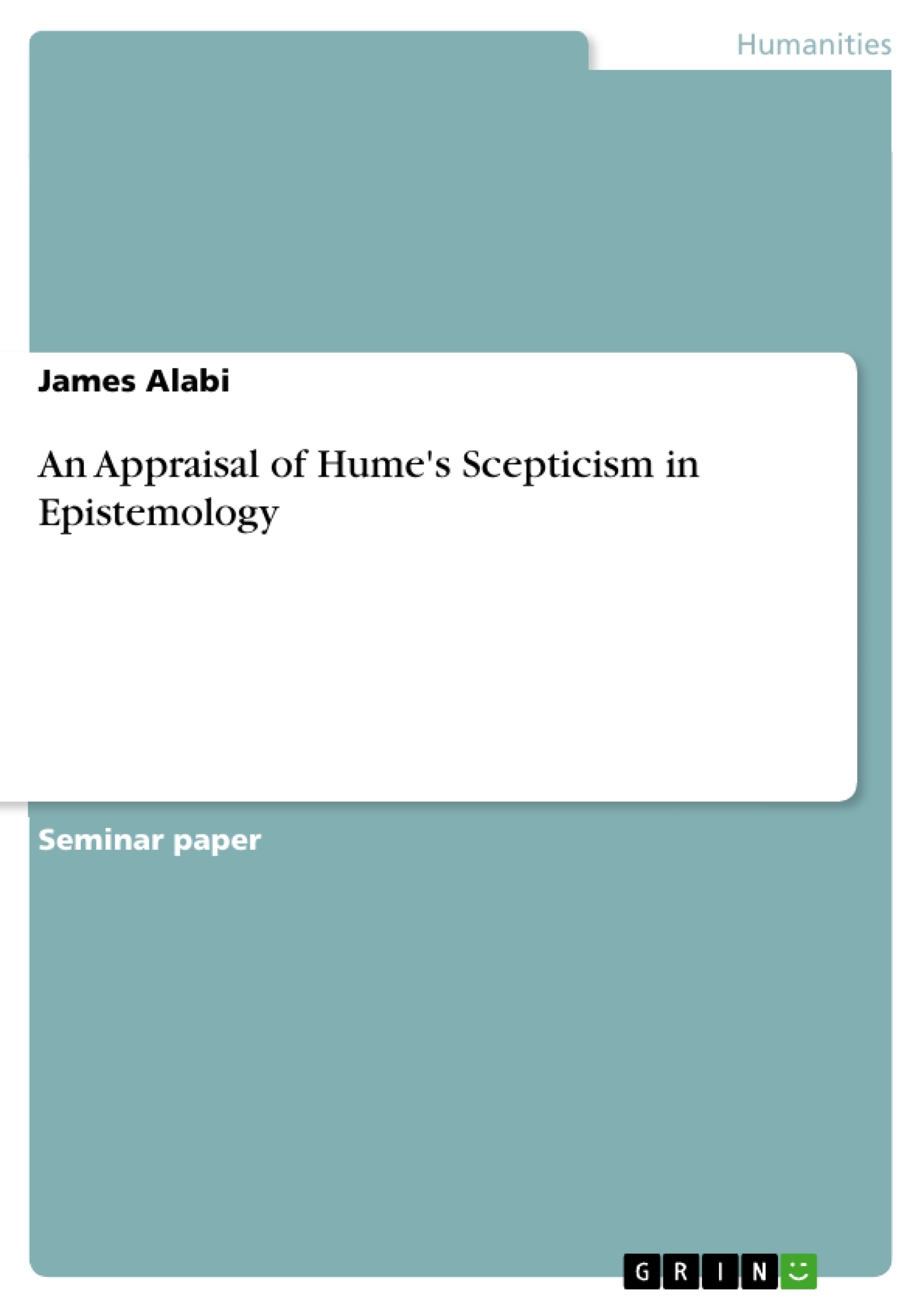What assures us of ‘existences and objects we do not see or feel’? In other words, what leads us to form beliefs about unobserved matters of fact: that the sun will rise tomorrow, that Africa still exists, that the Normans won the Battle of Hastings? What is the correct account of causation? Since this ancient epoch, skepticism has taken a central,- in fact the driving seat- in epistemology with attitude among philosophers, particularly epistemologists, apparently tending to regard a skeptic as a foe rather than a friend, a threat rather than a tool, and a deconstructionist rather than a builder. Ironically, the troubling skepticism forms the foundation of all epistemological enterprise. With the historical development of epistemology, one could possibly establish a self-contradiction any attempt deny the skeptic position of Protagoras- that there are many events that hinder and deny us of an indubitable, sure and stable knowledge.
The ancient period prepared the ground for inquiry, but the medieval (dark) age almost collapsed this foundation with recourse to faith and subjection of reason to the dogmatism of the instrument of faith. However, there was resurgence in the modern era of philosophical reflection, with several attempts to restore reason back to its rightful place in philosophy. One of those philosophers who attempted to rescue epistemology from the unphilosophical and dogmatic theologism was David Hume. Of course, the methodic doubt scepticism of Rene Descartes, French rationalist, was pivotal to all other discussions in the modern period. However, Hume’s resurgent effort was to see that inquiry is once again made into the nature of things, including claims about and of God, human life, scientific processes and procedures, causation, and inductive reasoning. Hume’s effort was to mitigate skepticism and forge a veritable mid-point and alliance between what can be known and what cannot be said to be known. Well, his thought on the endorsement of a priori propositions and some part of a posteriori propositions and rejection of some, such as causation and inductive reasoning has earned him such appellation as a ‘thorough going skeptic and empiricist.’ Our concern in the paper is to take a second but critical investigation into Hume’s idea of causation vis-à-vis the appellation. The paper attempts to literally play the devil’s advocate to examine if such appellation could pass for Hume.
Inhaltsverzeichnis (Table of Contents)
- INTRODUCTION
- Skepticism as not anti-epistemology
- Two-Type Categories of Skepticism
- Defining Skepticism and the mission of the Skeptic
- Hume and the Humean Skeptical Legacy of Causal Relation
- Hume and the Dogma of Cause-Effect
- Cause and Effect as mere association of Ideas
Zielsetzung und Themenschwerpunkte (Objectives and Key Themes)
This paper aims to critically investigate Hume's idea of causation in light of his skepticism, particularly examining whether the appellation of "thoroughgoing skeptic and empiricist" is truly applicable to him. The paper explores the role of skepticism in epistemology, analyzing its contributions to the development and survival of philosophy. It also delves into the nature of skepticism and its different categories, including knowledge-skepticism and justification-skepticism.
- The role of skepticism in epistemology and its historical development
- The nature and categories of skepticism, including knowledge-skepticism and justification-skepticism
- Hume's skeptical approach to causation and its implications
- The relationship between skepticism and empiricism in Hume's philosophy
- The "saving mission" of skepticism in rescuing epistemology from uncritical philosophy
Zusammenfassung der Kapitel (Chapter Summaries)
- INTRODUCTION: This chapter introduces the paper's central question: whether Hume's skepticism extends to a rejection of causation and inductive reasoning. It also outlines the historical context of skepticism in epistemology, from ancient philosophers to the modern era.
- Skepticism as not anti-epistemology: This chapter argues that skepticism, contrary to popular perception, is not anti-epistemological but rather a crucial tool for advancing epistemological discourse. It emphasizes Hume's use of skepticism to rescue epistemology from uncritical philosophy.
- Two-Type Categories of Skepticism: This chapter discusses Moser's classification of skepticism into knowledge-skepticism and justification-skepticism, highlighting the distinction between skepticism about knowledge and skepticism about justification.
- Defining Skepticism and the mission of the Skeptic: This chapter defines skepticism and explores its various forms and missions. It emphasizes the importance of skepticism as a tool for interrogating epistemological claims.
- Hume and the Humean Skeptical Legacy of Causal Relation: This chapter begins to delve into Hume's skeptical approach to causation, examining his argument that causation is not a matter of necessary connection but rather an association of ideas.
Schlüsselwörter (Keywords)
This paper focuses on skepticism, epistemology, Hume, causation, empiricism, knowledge, justification, knowledge-skepticism, justification-skepticism, and the historical development of philosophical inquiry.
Frequently Asked Questions
Is David Hume considered a thoroughgoing skeptic?
The paper investigates this appellation, specifically looking at Hume's rejection of necessary connection in causation and his skeptical approach to inductive reasoning.
What is Hume's view on causation?
Hume argues that cause and effect are not objectively linked by necessity but are rather a "mere association of ideas" based on constant conjunction.
How does skepticism benefit epistemology according to the paper?
Skepticism is viewed as a "saving mission" that interrogates claims and rescues philosophy from dogmatism, acting as a tool rather than a threat.
What are the two categories of skepticism mentioned?
The paper classifies skepticism into "knowledge-skepticism" and "justification-skepticism" based on Moser's classification.
What was Hume’s goal regarding dogmatic theologism?
Hume attempted to restore reason to its rightful place and rescue epistemology from uncritical, dogmatic theological assumptions through methodic inquiry.
- Citation du texte
- James Alabi (Auteur), 2018, An Appraisal of Hume's Scepticism in Epistemology, Munich, GRIN Verlag, https://www.grin.com/document/450100



